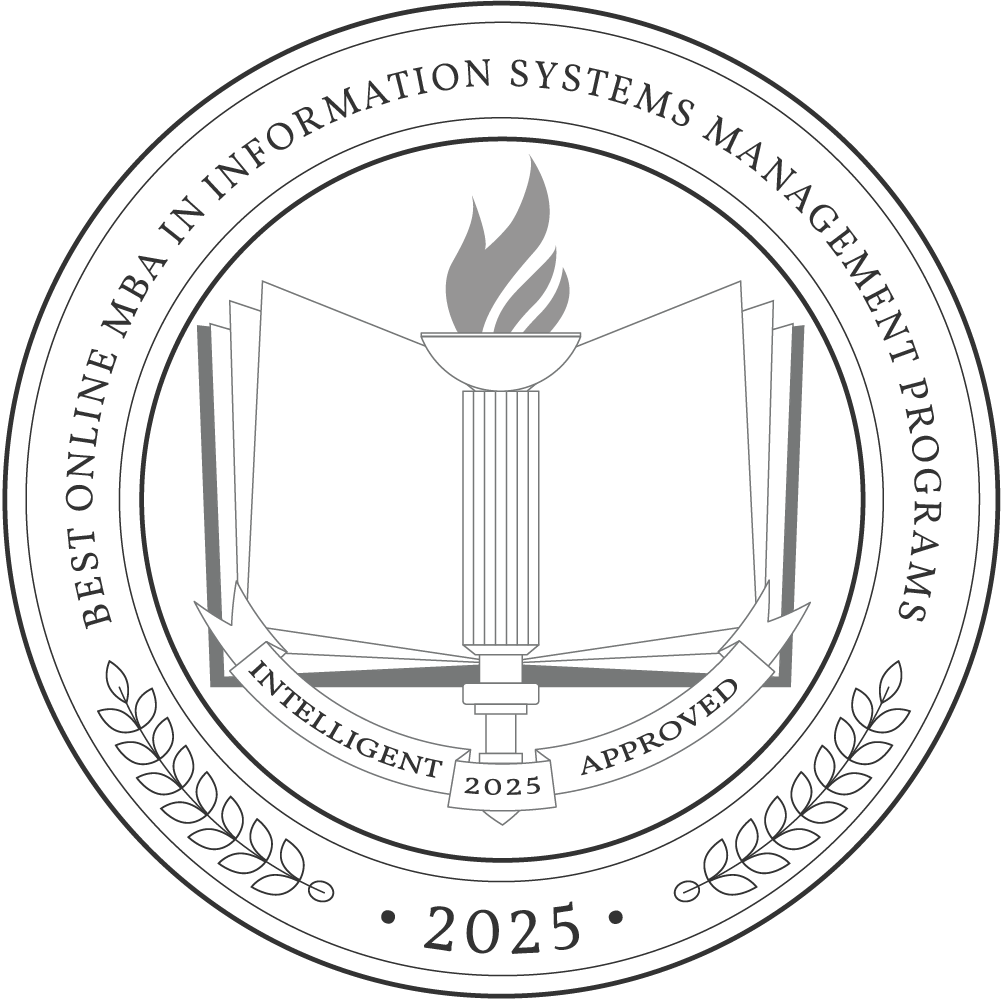Positioned at the intersection of business and technology, an online MBA in information systems management can prepare you for an IT manager, data analyst, or IT project manager career. These positions often come with competitive salaries, with IT managers earning a median salary of $169,510 annually and operations research analysts earning $83,640 annually.
Most full-time students graduate in 18 months to two years. The average annual tuition for a graduate degree program is $12,596 at public institutions and $28,017 at private universities.
Why Trust Us
The Intelligent.com Higher Education Team is dedicated to providing students with independent, equitable school and program rankings and well-researched resources. Our expert-driven articles cover topics related to online colleges and programs, paying for school, and career outlooks. We use data from the U.S. Department of Education’s College Scorecard, the National Center for Education Statistics, and other reputable educational and professional organizations. Our academic advisory team reviews content and verifies accuracy throughout the year for the most current information. Partnerships do not influence rankings or editorial decisions.
- Analyzed over 2,000 national, accredited, and nonprofit colleges and universities
- 800+ rankings pages are reviewed and updated yearly
- Content is informed by reputable sources, surveys, and interviews with academic advisors and other experts
- Over 100 data points are reviewed for accuracy and quality throughout the year, including sources
How we rank schools
Our list features the best online MBA in Information Systems Management degree programs at top colleges nationwide. Each school featured is a nonprofit, accredited institution — either public or private — with a high standard of academic quality for post-secondary institutions.
We evaluated each school’s program on tuition costs, admission, retention and graduation rates, faculty, reputation, and the student resources provided for online students. We collected data from trusted sources like the National Center for Education Statistics, individual school and program websites, school admissions counselors, and other data sources. Then, we calculated the Intelligent Score on a scale of 0 to 100 based on the following criterion:
Academic Quality:
- Admission rate versus enrollment rate
- Retention rate of students who return after year one
- Accreditation status (regional and programmatic)
- Nonprofit status, both private and public institutions
Graduation Rate
- Overall graduation rate
- Total number of currently enrolled students, including diversity metrics
- Student-to-faculty ratio
Cost and ROI
- In-state and out-of-state per-credit tuition rates and fees
- Required credits to graduate
- Earning potential after graduation
- Availability of federal student loans, scholarships, and other financial aid options
Student Resources
- Available student services for online-only and hybrid programs
- On-campus amenities like tutoring centers and the number of libraries
Read more about our ranking methodology.
Best 13 Accredited Online MBA in Information Systems Management Programs
FiltersInstitution Type
Status
- Intelligent Score
- Alphabetically By University Name
- Acceptance Rate
- Enrollment
- In-state Graduate Tuition
- Out-of-state Graduate Tuition
- In-state Undergraduate Tuition
- Out-of-state Undergraduate Tuition

University of Maryland
Intelligent Score: 99.08In-state: $8,824
Out-of-state: $34,936
In-state: $13,158
Out-of-state: $13,158
SAT: 1270-1480
ACT: 30-34
$1,733
Online
Association to Advance Collegiate Schools of Business
54-56

University of Utah
Intelligent Score: 98.91In-state: $7,412
Out-of-state: $26,017
In-state: $6,666
Out-of-state: $6,666
SAT: 1130-1350
ACT: 22-29
$1,350 - $1,450
Online
Association to Advance Collegiate Schools of Business
48

FAU College of Business
Intelligent Score: 96.07In-state: $2,522
Out-of-state: $14,374
In-state: $5,467
Out-of-state: $5,467
SAT: 1060-1220
ACT: 21-26
$800
Online, On-Campus
Association to Advance Collegiate Schools of Business
40-46

Central Michigan University
Intelligent Score: 95.46In-state: $12,296
Out-of-state: $22,881
In-state: $14,223
Out-of-state: $14,223
SAT: 1000-1210
ACT: 20-26
$808
Online, On-Campus
Association to Advance Collegiate Schools of Business
36

West Texas A&M University
Intelligent Score: 94.41In-state: $5,748
Out-of-state: $7,195
In-state: $4,968
Out-of-state: $4,968
SAT: 920-1130
ACT: 18-23
$500
Online
Association to Advance Collegiate Schools of Business
37

Wayne State University
Intelligent Score: 93.99In-state: $13,024
Out-of-state: $29,894
In-state: $16,285
Out-of-state: $16,285
SAT: 1000-1200
ACT: 20-27
In-State: $885
Out-of-State: $1,774
Online
Association to Advance Collegiate Schools of Business
36

Saint Francis University
Intelligent Score: 93.69In-state: $38,728
Out-of-state: $38,728
In-state: $25,000
Out-of-state: $25,000
SAT: 1010-1220
ACT: 22-26
$875
Online, On-Campus
International Accreditation Council for Business Education
36-48

Concordia University Wisconsin
Intelligent Score: 91.22In-state: $32,660
Out-of-state: $32,660
In-state: $9,090
Out-of-state: $9,090
SAT: 990-1180
ACT: 19-25
$699
Online
Higher Learning Commission
36

Fort Hays State University
Intelligent Score: 91.11In-state: $4,140
Out-of-state: $14,580
In-state: $3,726
Out-of-state: $3,726
SAT: N/A
ACT: N/A
$374
Online
Association to Advance Collegiate Schools of Business
33

Baker College
Intelligent Score: 90.35In-state: $9,960
Out-of-state: $9,960
In-state: $12,510
Out-of-state: $12,510
SAT: N/A
ACT: N/A
$600
Online
International Accreditation Council for Business Education
36

Lamar University
Intelligent Score: 88.85In-state: $6,129
Out-of-state: $15,945
In-state: $6,397
Out-of-state: $6,397
SAT: 943-1140
ACT: 17-23
$438
Online
Association to Advance Collegiate Schools of Business
30

University of West Alabama
Intelligent Score: 88.42In-state: $9,100
Out-of-state: $18,200
In-state: $6,678
Out-of-state: $6,678
SAT: N/A
ACT: 17-22
$429
Online
Accreditation Council for Business Schools and Programs
33

New Jersey Institute of Technology
Intelligent Score: 87.10In-state: $14,448
Out-of-state: $30,160
In-state: $20,624
Out-of-state: $20,624
SAT: 1200-1390
ACT: 25-31
$1,143
Online, On-Campus
Association to Advance Collegiate Schools of Business
36
How To Choose an Online MBA in Information Systems Management Program
Choose your area of study
Many online MBA in information systems management programs will allow you to select a concentration and focus your studies on a particular niche in this field. This additional level of specialization can help tailor the courses you take and the topics you study to your interests, career goals, and the skills you wish to develop.
Some popular specializations in this field include cybersecurity, data analytics, IT strategy, and business intelligence. A student with a technical background and an interest in protecting digital assets may be well-suited for a cybersecurity specialization. Those with a penchant for data analysis and decision-making might opt for data analytics. Students aspiring to bridge the gap between technology and business might find IT strategy or a business intelligence specialization more suitable.
Ultimately, selecting your area of study is a personal decision, and you should carefully evaluate your options and interests to narrow your search further.
Research schools and programs
After deciding on your study area, you can more effectively research the schools and programs that best suit your educational needs and career goals.
You should only apply to institutions that have been approved by a DOE-recognized regional accrediting organization, such as the New England Commission of Higher Education or Northwest Commission on Colleges and Universities. These organizations evaluate schools to ensure they provide students with a high-quality education. Those who attend a school that isn’t regionally accredited may be unable to access financial aid or transfer credits to another institution if needed.
Ideally, your online MBA in information systems management program will also be accredited by a respected industry group like the Association for the Advancement of Collegiate Schools of Business (AACSB) or the Accreditation Council for Business Schools and Programs (ACBSP). These programmatic accrediting organizations have particularly high standards for business education.
You should also gather information on each option’s curriculum, course offerings, and faculty expertise. To learn more about any schools that you’re interested in, you can visit the school’s website, contact an admissions counselor, follow the school on social media, or attend an in-person or virtual open house.
Prepare for tests and applications
Now that you know the schools you plan on applying to, you can productively prepare for applications and any necessary tests.
Application requirements vary by school. First, familiarize yourself with the specific requirements of your desired programs and create a timeline to ensure all necessary documents are submitted on time. For standardized tests like the GMAT or GRE, allocate dedicated study time to your daily or weekly schedule. Some students benefit from including a test preparation course in their study regimen or utilizing official practice tests to sharpen their skills. It’s worth noting there are online MBA programs that don’t require GMAT scores, though.
Additionally, dedicate ample time to crafting a well-written personal statement and gathering solid letters of recommendation. Both elements speak directly to your character and potential for success in the program, so giving yourself and your recommenders plenty of time to complete them is crucial. Undergraduate transcripts will typically be required as well.
It’s also worth noting that you should always contact an admissions counselor to ensure you have the most accurate information regarding requirements and deadlines.
Select your program
Before making your final decision, review your needs and goals again. Do you plan to attend school full-time or part-time? Do you want your program to be as online as possible, or are you fine with a hybrid program that has a fair amount of in-person requirements? Some programs offer asynchronous courses, which can be completed at your own pace, while others only offer synchronous courses, which involve remotely attending lectures and completing assignments at the same time as other students — which of these two online learning formats do you prefer? Your school should accommodate your scheduling needs and learning preferences.
Determine how you’ll pay for your degree
Speak to financial aid counselors at the schools you’re interested in for the most accurate and specific information about program cost.
There are multiple options at your disposal to help you finance your degree. First, complete the Free Application for Federal Student Aid (FAFSA) to determine your eligibility for federal grants, loans, and work-study programs. In addition, research scholarships and grants explicitly targeted toward MBA students or those in the field of information systems.
Lastly, check with your employer to see if you qualify for employer tuition reimbursement programs. Some companies and corporations may cover some of your tuition if your degree relates to your current career.
What Can You Expect From an Online MBA in Information Systems Management Program?
Earning an MBA in information systems management can help you build a unique skill set that combines business administration principles with information systems and technology. With this focus, you’ll learn about strategic planning, project management, data analysis, cybersecurity, and emerging technologies relevant to the field.
Most full-time students can earn their degree in one to two years, while part-time students may take up to three years. Some universities offer fully online MBA programs; others may require in-person workshops or residencies. These requirements allow students to engage with faculty, peers, and industry professionals, fostering collaborative learning and networking.
Potential courses you’ll take in an online MBA in information systems management program
- Information Technology Strategy: A common requirement in most programs, this course focuses on developing strategic thinking skills to align information technology (IT) initiatives with business objectives. Students will learn to evaluate IT investments, analyze competitive landscapes, and develop IT strategies that support organizational goals.
- Database Management Systems: Database management is vital to this degree plan. This course helps students understand database models, query languages, normalization techniques, and data integrity constraints. Through hands-on exercises and projects, students will acquire practical skills in designing efficient databases, optimizing queries, and ensuring data security and integrity within organizational contexts.
- IT Project Management: This course delves into the fundamental principles of managing technology-driven projects in businesses and organizations. Students will gain expertise in project planning, resource allocation, risk management, and project evaluation. They also develop critical skills in leading project teams, managing stakeholder expectations, and ensuring successful project delivery within budget and timeline constraints.
- Enterprise Systems and Business Process Integration: Frequently an elective, this course focuses on understanding and managing complex enterprise systems that integrate various business processes. Students will learn about enterprise resource planning (ERP) systems, supply chain management, customer relationship management (CRM), and business process reengineering. Overall, they will learn how technology can optimize organizational processes and enhance efficiency.
- Emerging Technologies and Innovation: A popular course due to its orientation toward the future, this class explores the latest trends and advancements in technology, such as artificial intelligence, blockchains, and cloud computing. Students will examine the potential impacts of these technologies on businesses and learn how to leverage them to drive innovation, gain a competitive edge, and create new business opportunities.
What Can You Do With an Online MBA in Information Systems Management?
Career outlook
An MBA in information systems management opens opportunities in the business and technology sectors. This field is dynamic and constantly evolving and will continue to shape the job landscape in the coming years. With training in both those fields, an individual may find work in finance, healthcare, retail, or a broad range of other sectors.
Here are some of the possible career paths you might take with your MBA in information systems management:
- Information systems manager — Assess an organization’s technology needs, plan IT projects, and hire and supervise IT staff.
- Median annual salary: $169,510
- Projected employment growth (through 2032): 15%
- New job openings projected: 46,900 annually
- Computer network architect — Design, implement, and upgrade data communication networks.
- Median annual salary: $129,840
- Projected employment growth (through 2032): 4%
- New job openings projected: 10,200 annually
- Top executive — Coordinate the work of an organization by establishing goals, overseeing activities, and appointing department heads and managers.
- Median annual salary: $103,840
- Projected employment growth (through 2032): 3%
- New job openings projected: 311,600 annually
Online MBA in Information Systems Management Degree Frequently Asked Questions
How do I apply to an online MBA in information systems management degree program?
Research accredited universities known for their reputation in business or information systems. While many institutions share similar admissions requirements, like transcripts, letters of recommendation, and a statement of purpose, others may have specific prerequisite courses and criteria you’ll need to fulfill to be eligible for admission. For instance, some programs may require standardized test scores, like the GRE or GMAT, while others have moved to test-optional policies.
It’s crucial to consult with an admissions counselor while you’re still in the early stages of applying to ensure you understand the program’s prerequisites, deadlines, and specific requirements.
How much does an online MBA in information systems management degree cost?
The average annual cost of graduate school tuition is $20,513. Private schools tend to be more expensive than public schools, though public schools usually charge out-of-state students a much higher tuition rate than in-state students.
It’s also important to consider the additional costs you may incur beyond the tuition. Some examples of these expenses include course materials, textbooks, technology fees, and online platform subscriptions.
How long does it take to earn an online MBA in information systems management degree?
Most full-time students complete their online MBA in information systems management program in 18 months to two years, while part-time students may take up to three years to meet the degree requirements. Since online learning often allows students to complete their degree at their own pace, this figure can vary from person to person. Some students may be able to focus solely on their education and graduate earlier, while others may be balancing their learning with other responsibilities and need to take more time. Lastly, the number of credits required to graduate will vary depending on the institution, which may cause the timeline to be shorter or longer.
Is an online MBA in information systems management degree worth it?
An online MBA in information systems management can be worth it if you relish the opportunity to work in both the business and the information technology sectors. Your MBA can help you gain leadership or managerial roles with rich opportunities for advancement and lucrative salaries. For example, the median pay for a database architect is $117,450 per year, with the top 10% earning more than $157,710.
Your MBA degree will provide you with a well-rounded skill set, including training in business strategy, project management, data analytics, and technology management — all of which make you a more versatile professional and more valuable on the job market. The demand for individuals with these skills is strong, especially in businesses that rely on technology.
Undertaking your MBA program online can be an excellent choice for its flexibility and convenience, particularly for adult learners with other professional or personal commitments.

